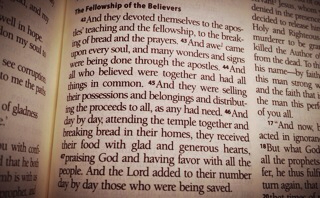The words that we use mean things. We convey our message through them which others can then interpret and understand. It is something that we understand instinctively and the system breaks down when we start using alternative meanings for our words. Just talk to a teenager for a length of time and you will get a pretty good example of how the conversation breaks down.
But it breaks down other times as well.
I had an example of this recently while dealing with our veterinarian. Velvet, who is as best as my wife can remember, is about 20 years old and is quite old for a cat. While she is in good shape for her age–as in breathing with regularity–she is starting to have problems. One of them is high blood pressure.
I didn't know that cats could have high blood pressure.
I am sure that the stresses of her life don't help. She has really big decisions to make such as whether to eat, sleep, meow, or one of the three "p's." If you've owned a cat or dog (or raised a baby for that matter), you know the three "p's." Each of those tasks present further stressful situations. For example, should she sleep on the bed, couch, cat tower or one of two office chairs? Should she let loose the hairball in Mike's shoe, sandal or slipper?
In the quest to treat her high blood pressure our vet wants to have her blood pressure regularly. I wasn't sure exactly how they would do that. I figured that a people sized blood pressure cuff would just make her head swell up like a balloon. I would guess having a super-sized head that wouldn't be very helpful to the situation. But the technological and logistical issues that would come with a cat sized cuff and stethoscope seem almost insurmountable. Besides cats usually don't like to have their paws messed with and come equipped with razor sharp claws and teeth.
They also don't have a real big problem with using said claws and teeth when someone wearing a white lab coat starts poking and prodding. Just ask our previous vet. Velvet bit a couple of his tongue depressors in half.
When the vet checked Velvet's blood pressure and it was in the "I have no idea how this cat is still alive" category. We were given a one month supply of medication to control her blood pressure. The vet told us that we should not stop giving the medication to her because she could have a stroke without it. It was then "recommended" to me that we might want to have Velvet's blood pressure rechecked in about a month. When I went in to the office to refill her medication I was told that they would not refill it without her being scheduled for another blood pressure test.
It was at this point that I realized that the vet's meaning of the word "recommended" was very different from what I understood the meaning to be. I understood it to mean that the vet was recommending that the test be taken while the vet meant that the test had to be taken. I was not planning on having the test done again partly because of the expense but mostly because the visit to the vet is the single biggest source of stress for the little fur-ball. But I understand that giving medication to lower blood pressure without monitoring the blood pressure can be just as dangerous.
The problem lie in the fact that what was communicated was not what I understood as being communicated. And that problem goes far beyond just this particular incident with the vet. I too can say things where I try to "soften the blow." It is very easy to obscure our meaning behind the words that we choose and that is not fair to our listener. Jesus
said:
"Let what you say be simply 'Yes' or 'No'; anything more than this comes from evil."
I am not saying that on the part of my veterinarian there was any intentional miscommunication with me; upon reflection it does strike me as the way that a doctor would use the word "recommend." But I know there are times when I have been intentional about being vague or deceptive in the way that I communicated with others. When we are intentionally vague or even deceptive with how we say things, it is wrong. It is in fact a type of lie. We can and should do better than that.
Now if I can just get Velvet to lay off the deep fried tuna with a side of chili cheese fries...










